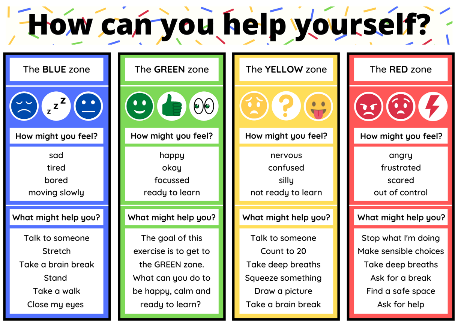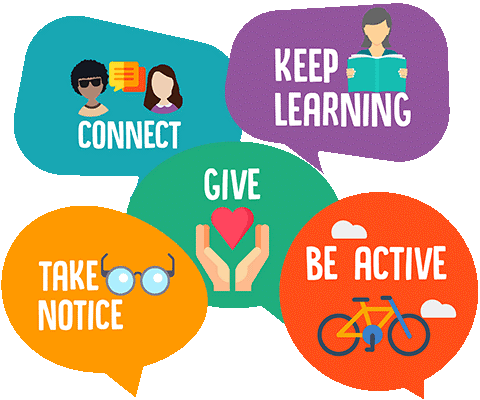At the Carey Federation we are committed to make a difference to supporting the positive mental health and emotional wellbeing of our whole school community (children, staff, parents and carers).
We have a supportive and nurturing ethos and our approach is to be respectful and kind, where each individual and contribution is valued. We are aspirational for our children and believe that to have a fulfilling education, we must nurture our children’s well-being and happiness. We work with determination, whatever issues our children, their families, our team or the community face, we always support and work together. This is echoed in our motto: Aim High; Be Resilient; Take Care of Each Other.
We endeavour to ensure that children are able to manage times of change and stress and aim to ensure that they are supported to reach their potential or to access help when they need it. We believe that by equipping our children with knowledge and skills they may be more prepared to face challenges in life.
For our Mental Health and Wellbeing policy please click on the link:
At our schools, we promote a mentally healthy environment through:
- Promoting our school values and encouraging a sense of belonging
- Promoting pupil voice and opportunities to participate in decision-making
- Celebrating academic and non-academic achievements in order to promote self-esteem
- Providing opportunities to develop a sense of worth through taking responsibility for themselves and others
- Providing opportunities to reflect
- Access to appropriate support that meets their needs
- Helping children to understand their emotions and feelings better and to feel comfortable sharing any concerns or worries.
- Teaching strategies to develop emotional resilience, to manage challenges in life. E.g using Scarf Coram resources and Zones of Regulation.

At school, we encourage the children to recognise their mental wellbeing. Evidence suggests there are 5 steps we can all take to improve our mental wellbeing:
 5 ways to support our Mental Health:
5 ways to support our Mental Health:
- Connect– connect with the people around you: your family and friends. Spend time developing these relationships.
- Be active– take a walk, go cycling or play a game of football. Find a physical activity that you enjoy and make it a part of your life. Exercising makes you feel good.
- Keep learning– learning new skills can give you a sense of achievement and a new confidence, as well as being fun. This includes hobbies and interests as well as academic learning.
- Give– even the smallest act can count, whether it’s a smile, a thank you or a kind word. Do something nice for another person or group/class.
- Take notice– be mindful of feelings, sensations, surroundings and nature. Be curious, catch sight of the beautiful and remark on the unusual. Notice the changing seasons. Be aware of the world around you and what you are feeling.
We offer different levels of support:
Universal Support – To meet the needs of all our pupils through our ethos and motto and our wider curriculum. For instance, developing resilience for all.
Additional support – For those who may have short-term needs and those who may have been made vulnerable by life experiences such as bereavement.
Targeted support – For pupils who need more differentiated support and resources or specific targeted interventions such as nurture groups.
What do we currently do for mental health and wellbeing for our pupils and staff?
- Our ethos is to promote the development of being Resilient, Resourceful, Reflective and Respectful through developing relationships.
- We have a designated Mental Health and Well Being Lead in school that is responsible for promoting wellbeing for our staff and pupils.
- We have staff who deliver nurture groups for pupils, such as small group ‘time to talk’ social skills work, resilience skills, ‘it’s good to be me’ groups and 1:1 check in with pupils.
- In each class we have worry boxes for pupils to share their worries with a safe adult.
- We have nominated school council members in each class to represent their peers and gain feedback in class assemblies.
- We have an open door policy for parents’ to meet with Class teachers/ Senco for parents to share their concerns and worries.
- We have email addresses/Class Dojo for all teaching staff so parents can email concerns or worries.
- We have home/school communication books for pupil’s who require more regular communication.
- We have move up sessions, extra transition sessions and meet the teacher sessions for when a pupil is finding a class move difficult.
- We have activities at designated times at lunchtime to promote mental health and wellbeing and support for pupils who find busy lunchtimes stressful.
- We have positive behaviour systems in place to promote positive social behaviour.
- We have mental health and wellbeing assemblies to promote resilience and self-management.
- We have a PSHE curriculum (Scarf Coram) that helps pupils to build important life skills, such as learning to learn, habits of mind and the growth mindset.
- We have a Mental Health and Wellbeing Policy for our school which is regularly updated.
- We include World Mental Health Day and Mental Health Awareness Week in the school calendar and plan activities for the whole school.
- Staff are able to access ‘Health assured’ an Employee Assistance Programme (EAP) to support their own needs.
The Carey Federation offers pupils many opportunities to do physical activities as well as opportunities to relax which both are ways to promote wellbeing and positive mental health.
- Games to play outside at lunchtime.
- Library open at lunchtime each Thursday to borrow books to read
- Active learning.
- Home Learning Projects
- Themed Days
- Educational day visits
- Before and after school clubs.
- Outside learning e.g. Wildtribe.
Celebrating Success
We like to celebrate our many successes together by:
- Posting achievements on Class Dojo to celebrate what is taking place in classrooms.
- Displaying pupil’s work
- Celebration Assembly each week, with certificates.
- Class Assemblies
- School newsletters
- Dojo points, House points and class awards.
Mental Health Support Teams
We are currently living through extremely challenging times, and now perhaps more than ever, looking after our mental health and well-being is of paramount importance to us all.
What do I do if I am worried about my child’s mental health or wellbeing?
You can:
- Go to your GP as a first port of call as they are a useful place to gain medical support and signposting of local services, or speak to a School Nurse. Referrals for the School Nurse service can be made both through your GP and through school. https://www.devon.gov.uk/educationandfamilies/health/public-health-nursing/
- Talk to your child’s class teacher, Executive Head teacher, (Mrs Alford) or Senco (Mrs Cawsey) about your child’s needs or your concerns.
- Young Minds – The Parents Helpline is available to offer advice to anyone worried about a child or young person under 25. You may have questions about a child’s behaviour, emotional well-being, or mental health condition. Here is a link to their website: https://www.youngminds.org.uk/
- Early Help – services for children, young people and families, offering the right support when you need it most. It may be you have noticed; low mood, worry, anxiety or stress, sleep problems, toileting issues etc.
Parents can make a referral or find well being information at: https://www.devonscp.org.uk/health-and-wellbeing/
Don’t be put off by the page title relating to safeguarding– safeguarding encompasses a lot more than child protection. Early Help customer services team – 0345 155 1071. They are open Monday to Friday 8am–8pm and Saturdays 9am–1pm or approach a member of School staff.
- NHS Resources
Here are a few simple ways you can encourage your child to express themselves. Could you build on existing interests or passions? What has helped them get through the past year. A love of dancing? Baking? Drawing? Fashion? Encourage your child by doing a range of activities.
https://www.nhs.uk/oneyou/every-mind-matters/– A public health England and NHS site to help people take simple steps to look after their mental health, improve their mental wellbeing and support others.
NHS Berkshire West and East Berkshire Clinical Commissioning Groups (CCGs) have relaunched the mental health booklet – the Little Blue Book of Sunshine:
Little Blue Book of Sunshine 2020.pdf.
The book offers lots of practical and useful advice and aims to help children and young people by sharing tips on how to deal with problems, such as anxiety, stress, relationships and anger. It also includes information about where to get help when they need it.
- CAMHS
CAMHS stands for Child and Adolescent Mental Health Services. CAMHS is the name for the NHS services that assess and treat young people with emotional, behavioural or mental health difficulties.
For more information, visit the website below:
https://childrenandfamilyhealthdevon.nhs.uk/camhs/
Children’s Mental Health Week 2024
Between 5th – 11th February, we will be joining in with the Children’s Mental Health week following the theme of ‘My voice matters’ On Friday 11th February, will be encouraged to wear or Scarf to express themselves. They will be taking part in a ‘When I’m listened to…’ activity to get children thinking about what it feels like to be heard, sharing their views about being heard.
Bereavement
If you have suffered a bereavement and feel that school can support, please do contact us.
Here are two amazing organisations in our local community that can offer support:
Books to support Bereavement:
- The Invisible String by Patrice Karst and Joanne Lew-Vriethoff
- Muddles, Puddles & Sunshine by Winstons Wish – is an activity book.
- Dogger – a gentle intro to discussion for very young children
- Badger’s Parting Gifts by Susan Varley (particularly useful if an older person has died).

 5 ways to support our Mental Health:
5 ways to support our Mental Health:
Recent Comments